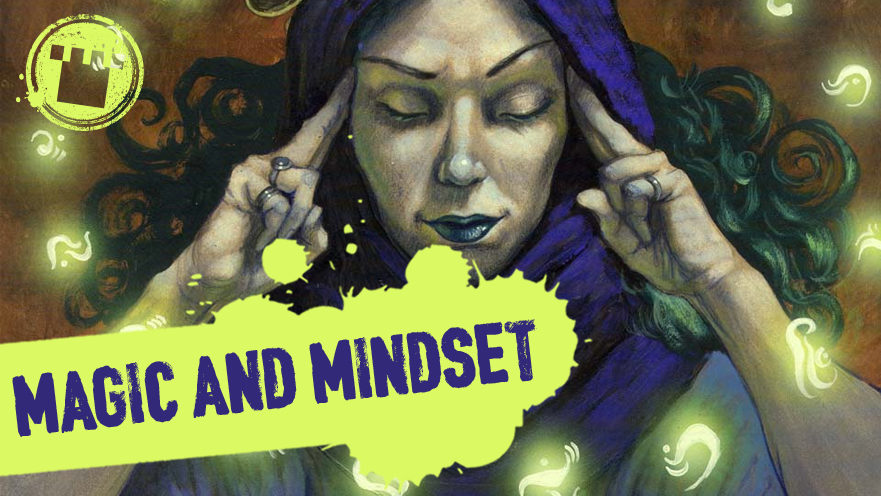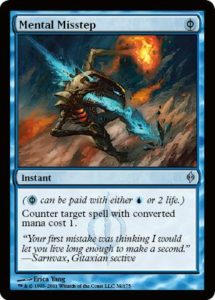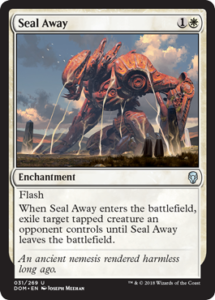Learning to play Magic represents a huge turning point in my life. I had just graduated from college and moved thousands of miles away from home, and I needed a way to connect with people in my new city. Magic helped me find friends and feel like part of a community for the first time in my life; it even led me to a fulfilling career here at Card Kingdom.
Naturally, I’ve grown and changed quite a bit in the years since I’ve been playing Magic, and I’m beginning to think the game itself may be partly responsible. Before I learned to play Magic, I never put in the work necessary to excel at any of my hobbies. I never lasted more than a season on any of my childhood sports teams, and I abandoned every musical instrument I picked up because I didn’t feel like practicing. In school, I maintained a high GPA by sticking to subjects I was good at – writing, literature, languages – instead of pushing myself to explore coursework that I found challenging.
Magic was different, though. Magic wasn’t like reading or drawing – a hobby that I could enjoy by myself. It was a means of connecting with others – something I could share with my new Seattle friends. While I struggled to make it through local Standard nights with a winning record, I felt obligated to tough it out for the sake of my friendships. If I could improve at Magic, I could contribute equally to my friends’ conversations about the game, and maybe, one day, I could help them as much as they’d helped me.
After about six straight months of losing at local events, my play slowly started to improve, and so did my results. All it took was a change of mindset.
What is Mindset?
In her 2006 book Mindset, psychologist Carol S. Dweck explores two ways of thinking that affect the way we learn, compete, and relate to one another. People with a fixed mindset believe that humans are born with certain abilities and traits; these people value innate intelligence and talent, and they believe we should pursue hobbies and careers that “come naturally.” Meanwhile, those with the growth mindset believe that abilities can be cultivated through hard work and perseverance.
As we grow up, we inherit our mindset from our parents, teachers, coaches, and other mentors. My fixed mindset was passed down to me by my fixed-mindset parents, who viewed my writing skills as a “gift.” They praised my intelligence and good grades, but never pushed me to do anything I found challenging – if I wasn’t excelling in ballet class, I could quit without facing any consequences.
My fixed mindset caused me to develop a slew of unhealthy habits. I never learned how to properly study for a test because I was confident that I’d get good grades regardless. I didn’t put in the time necessary to improve further at the things I was already good at – at a certain point, I stopped going to the dictionary whenever I encountered a new word in a book. And most importantly, I never learned how to cope with failure and would blame outside factors whenever I came up short. When I did poorly on a math test, it was because the material was too difficult or the teacher hadn’t explained it well enough; I had always been told that I was good at math, so I couldn’t possibly be to blame for my bad grades!
Many of us know Magic players with fixed mindsets, who attribute their losses to bad draws, match-ups, or mulligans. Perhaps you’ve played against a player like this at your local Friday Night Magic, and have watched them flip through their library after a match: “I would have won if I had just drawn this card!” they’ll say. There’s a broad spectrum of players like this – some beat themselves up for “punting” a match and wallow in their defeat; others can’t even acknowledge their mistakes for fear of being labeled a “scrub.” After all, it’s easier to lament your losses than it is to push yourself to change.
I began my Magic career by pushing myself and was amazed at how much I achieved. Slowly, as I watched my work pay off, my mindset began to shift, and I began to apply what I’d learned to my other hobbies. I took computer programming classes and attempted to overcome my fear of heights by joining a rock climbing gym. I set small goals for myself and worked as hard as I could to achieve them. I viewed losses and minor setbacks as learning experiences; I refused to let my losses define me.
The major setbacks were harder to deal with – the cold streaks, the lost win-and-in’s. I’d find myself returning to the fixed mindset, worrying that I’d never be good enough and that all the hard work wasn’t worth it. Adopting a growth mindset wasn’t as easy as flipping a switch – the fixed mindset had been foisted on me from a young age, and unlearning all I’d been taught would be a lifelong process.
A Change of Mindset
After a year of struggling with my mindset, I felt like I needed a hard reset. I stopped playing Magic competitively for a while and focused on work and other projects. But after a while, I missed the grind of playing in tournaments and the people I met along the way. Most of all, I missed everything I’d learned from playing Magic – I missed the level-up moments and the feeling I had when I knew I played my best.
I’ve started easing myself back into playing regularly with the release of Dominaria. On Release Day, I played in my local game store’s quarterly Sealed FNM and opened a strong pool of cards for an Esper Historic deck. I had some of the best pieces of removal in the format – In Bolas’s Clutches, Time of Ice, Seal Away – and plenty of flyers to close things out. I made it through the first two rounds of the tournament without dropping a game.
In Round 3, I made a judgment call that would result in my first game loss. I had kept my opponent on the back foot for most of Game 1, whittling down his army of creatures until only Traxos, Scourge of Kroog remained. With my opponent’s life total in the single digits and my flyers threatening to end the game on the following turn, I had two options: cast Seal Away targeting Traxos, or play out another flyer to keep up the pressure in case my opponent had a removal spell. I chose the latter, and my opponent cast On Serra’s Wings targeting Traxos, creating an 8/8 flyer with lifelink that would never tap again.
Fixed Mindset Me would have been fuming in a situation like this. I had thrown away the game and might lose the match. But instead of worrying about what might happen, I tried to shake off the loss and focus on winning the next game. Okay, that was a mistake, I told myself. Lots of players make mistakes. Remember the time Gerry Thompson made a mistake in the Top 8 of a Pro Tour and then went on to win? Focus up, and you can win, too.
And I did. I set aside my mistake for a moment and dialed in to what was happening on the battlefield. I won the second game, and then I won the third.
After the match was over, I reflected on what had just transpired. Yes, I had made a play that cost me a game, but I didn’t let that play decide the match. I had kept a cool head and won the match when the odds were against me, and that brought me more pride than any play I’ve ever made.
The fixed mindset can be hard to resist, but I’ve learned to counter the negative thoughts in my head with more constructive ones. Whenever I feel tempted to avoid a challenge, I motivate myself to try and see what happens. Whenever I want to call myself a failure, I ask myself what I learned from my experience instead.
The next time you’re tempted to hide or avoid addressing a weak point in your game, think about how you can work to overcome it instead. You can spend countless hours learning the rules of Magic or getting reps with a deck, but the real key to success is a healthy mindset.
Header design: Justin Treadway
Header image: “Brainstorm” by DiTerlizzi

Hallie served as Content Manager for CardKingdom.com and editor-in-chief of the Card Kingdom Blog from 2017-2022. Part tournament grinder, part content creator, Hallie is always looking for ways to improve her game and to share what she learns with others.



